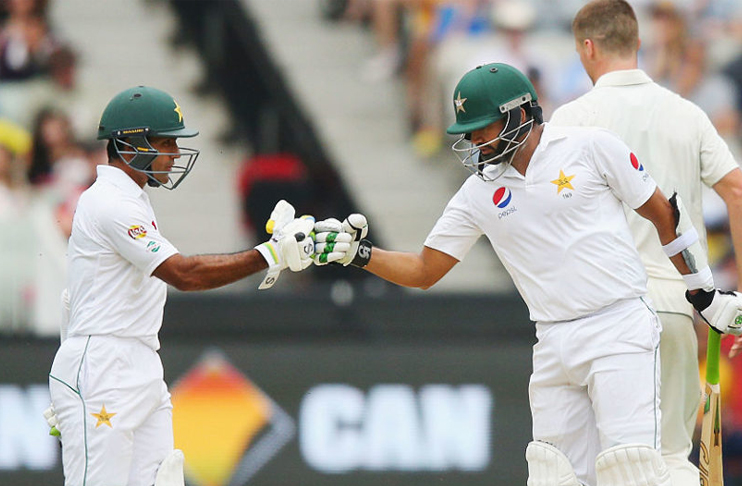Failed Azhar-Shafiq transition spells impending doom for Pakistan batting
December 19, 2016: Pakistan, led by Misbah, are against arguably the most uphill task in world cricket - chasing a fourth-innings target against Australia at the Gabba, and that too 490. Them having been bowled out 142 in the 1st innings meant that the game was written off as a foregone conclusion.

145 overs and 653 minutes later, the Australians breathed a sigh of relief. Usually, such exhalations directly reflect teams expressing their relief over beating bad weather to a result or knocking over a frustrating last wicket partnership but on that day in Brisbane, it was neither. It was Australia relieved that they, after setting a target of 490, narrowly avoided being defeated at the Gabba for the first time in 28 years, it was Australia relieved that they weren’t on the wrong side of yet another 400-plus fourth-innings chase and it was Australia relieved that their bowlers were ‘finally’ spared from the genius of Asad Shafiq, whose 137 almost turned out to be the catalyst for what would have been the greatest chase in Test history.
That day, Pakistan might have marginally fell short - by just 39 runs - but it was touted to be the beginning of a new era. An era in which the team would be driven forward by two men, Azhar Ali and Asad Shafiq who, with 55 and 51 Tests under their belt respectively, looked ready to take the baton from Misbah and Younis who, 39 and 42 years old respectively at the time of the Test, were running short on borrowed time. Almost four years later, that night in Brisbane looks, with every passing day, as one of the biggest false dawns in cricket this century.
For the performances of both Azhar and Asad since they became the top dogs in the side, have thrown the terribly-gone-wrong transition of Pakistan into sharp relief; their showing in the ongoing series against England, where together they’ve scored 79 runs in 6 innings at an average of 13.16, is just a projection of a long-term problem that has haunted Pakistan cricket and has, in many ways, hindered the team's progress and disrupted its future.
Together in 69 innings since the retirement of Younis Khan and Misbah-ul-Haq, Azhar Ali and Asad Shafiq have combinedly averaged a paltry 31.76. Here are two men, who spent the entirety of the first half of their Test careers learning and thriving under the tutelage of two of the best in the game’s history, who, when left on their own, when it was their time to take charge, have looked clueless, befogged and incapable of marshalling the side forward. This was never meant to happen, for both were old and experienced when they took over the mantle, yet it has. And what it has essentially done now is leave Pakistan in danger of encountering a low like never before when their time eventually comes to an end. Going by current form, that might not be very far away.
It would be naive to pretend that Pakistan’s batting is safe, or anywhere close to being reliable. Barring Babar Azam - who himself is in the process of developing, but has had to step his game up due to the situation around him - their entire batting line-up is either inexperienced and unproven or does not provide too much hope for the future.
Abid Ali might have had a brisk start to his Test career, but he is 32 (soon to be 33) and his tons have come against largely toothless attacks on flat surfaces; Shan Masood is probably the best of the lot, and his century at Old Trafford was a testament to his quality, but he, too, has quite a long way to go in Test cricket; It remains to be seen how much of his domestic cricket shenanigans Fawad Alam can replicate - if he’s given an extended run, that is - and the man whose absence in the squad enabled Alam to get a Test match, Haris Sohail, is himself 31, largely unproven against any quality bowling attack in challenging conditions.
In any other team, in any other era or in any other circumstance, the shortcomings of Azhar and Shafiq would not have been that big a deal or might not have that big an impact or effect, but their withering form is proving to be catastrophic for Pakistan - not in the short run, but in the long haul. At a time where both Azhar and Shafiq were expected to don the roles of Misbah and Younis, take responsibility, score a heavy load of runs to protect their teammates, allow them to thrive and perhaps even enable Pakistan to unravel the next Azhar and Shafiq (or Mis-You, whatever you may want to call it), their no-show has instead left the team in quite a precarious situation.
If and when the axe falls on the duo - which, going by their current form, might not be too far away - Pakistan are staring at a scenario where their most experienced Test batsman would be Babar Azam, who has less than 30 Tests under his belt. While the prospect of Azam steering Pakistan’s ship in red-ball cricket might not after all be so bad, what needs to be taken into account, however, is the domino effect the added responsibility could have on his batting, and his career in general, given he already has enough on his plate after being handed over the reins in limited-overs cricket.
Pakistan will also, on top of Azam having to carry the side single-handedly, when Azhar and Shafiq invariably leave the set-up, be up against the challenge of integrating the next generation of youngsters (preferably) into the team who, they think, will be talents worth investing on. This is easier said than done, for since 2014, barring Azam, no Pakistan batsman below the age of 30 has featured in 15 or more Tests. The batsman who came closest to the number is opener Sami Aslam - who debuted as a 19-year-old in 2015 - but he, too, was left out of the side after 13 Tests - in which he averaged a tad over 31 - and has not played a Test in over three years.
Time and again, they’ve also found themselves going back to the older players - Mohammad Hafeez, Taufeeq Umar and now Fawad Alam - with minimal success. Thus to say that the management and the selectors will have their task cut out, in terms of reassembling the side post the inevitable fallout, will be an understatement.
All said and done, it is clear that the transition - or the handover - from Mis-You to Azhar and Asad was inarguably a failure, but what spells doom for Pakistan is that the future looks even bleak. Certainly, this is not a scenario that Mis-You would have envisioned when they bid goodbye to Test cricket in 2017, after almost voluntarily stretching their careers. Not at least after seeing Azhar and Shafiq striking 24 tons scoring 8,399 runs at an average of 43.51 while the two of them were still active.
But such is the sport and this whole Azhar/Shafiq fiasco is yet another cruel reminder of its unpredictability. Their decline has all but ensured that Pakistan will be in for a rough year or two, or perhaps even longer than that, but the least they can do is show solidity, come the third Test and help keep their side’s record in England intact. The two young men who batted oh-so-fearlessly at the Gabba four years ago might be long gone, but if there’s any time for them to rewrite a foregone conclusion, this is it.

Comments
Sign up or log in to your account to leave comments and reactions
0 Comments